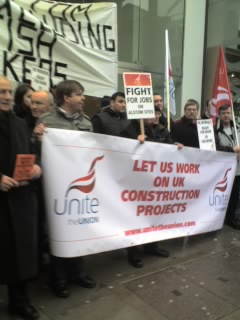Under capitalism there is a steady unremitting pressure on workers’ living standards from the capitalist class, particularly as they compete with one another, and with bosses all around the world, to cut costs - especially labour costs. This need for employers to attack the wages and conditions of European workers has been intensified by the onset of crisis.
There are huge discrepancies between national rates of pay within the European Union. Naturally bosses would like to exploit these differences. And the European Court of Justice is trying hard to help them.

The institutions of the European Union have always been a site of class struggle. As a rule, like the institutions of a capitalist nation state, they have served the interests of the ruling class. Now the European Court of Justice has handed out a number of anti working class judgements. They have become in effect vanguard fighters for European bosses. These cases are a serious threat to all European workers.
One of the EU’s ‘four freedoms’ is the free movement of labour. Actually socialists defend the principle of the free movement of workers. We believe that all workers should have the opportunity to do the best for themselves. Any attempt to restrict the movement of workers under capitalism would be an attempted restriction of free movement in search of a better life. That could only be in the interests of the capitalist class. This was the purpose of the pass laws restricting the movement of black workers in apartheid South Africa, for instance.
Bu that does not exhaust the question. Workers throughout history have bettered their lot not through individual endeavour, but through collective action. Whether to work abroad is a decision for an individual worker. But, wherever they are working, they become part of the working class in that country. To fight for a better life, they need to get involved in the labour movement there.
Workers sell their labour power collectively, as part of a work force. The workers formerly employed by the subcontractor Clarks at Lindsey Oil Refinery in Lincolnshire on the desulphurisation plant naturally expected to be taken on by the successor firm. This is the normal procedure in the industry. They were all part of the same team. In a sense this shows the fictitious nature of the subcontracting process in the construction industry, where the workers are regarded as self-employed. Whoever pops up as the employer for the time being makes no difference to the work being carried on, who does it and (usually) the rate for the job.
The bosses’ onslaught is made easier in the construction industry because of the jungle of subcontracting on sites. Bob Blackman of Unite explains why subcontracting is so convenient for construction employers, and what is needed to combat it. “In order to tackle the self-employed anarchy on the sites across the country we must have legally enforceable standards that apply to every single worker in the industry on every single contract. It's the only way to undermine bogus self-employment and ensure proper quality standards across the industry and provide a real level playing field. At the present time it is the better employers that are dragged down by the cowboys. This has got to stop.”
British workers in the engineering construction industry are, have fought to have all workers inthe industry covered by the NAECI agreement (National Agreement for the Engineering Construction Industry). The agreement is not a utopia. It is arrived at by collective bargaining between the bosses and the unions involved. Never the less it upholds the industry standard.

The successful struggle at Lindsey, and the current battles at Staythorpe and the Isle of Grain, are all about maintaining the minimum standards laid down by the national agreement.
It is a lie to say the workers in action were fighting for ‘British jobs for British workers.’ Their objection to the IREM subcontractors, who took over from Clarks at Lindsey, was not that the workers hired were Italian or Portuguese, but that they were not being paid the national rate. IREM workers were actually housed on floating barges in the North Sea. They were told not to show their wage slips to anyone.
The legal battle before the ECJ is around the Posted Workers’ Directive, dealing with the minority of migrant workers who are sent to work abroad by their employers. The Directive was actually pushed for by the German government to prevent German building workers being undercut by cheap foreign labour. The Directive was weakly drafted. It was left to national governments as to whether posted workers automatically were cut in to existing national agreements and received the normal wages and conditions, or whether they were just covered by the minimum wage for the country where they were working. The reason the Directive was weak and ambivalent was because of lobbying behind the scenes by the British Tories, and then by New Labour.
Alarmed by the loopholes, the TUC approached the British Labour government and received an assurance in the Warwick Agreement of 2004 that national implementation of the Directive would not allow undercutting. Gordon Brown addressed the 2005 TUC Conference with the words, “I am here today to tell you that Tony Blair and the government will as a priority put in place this year and next legislation honouring in full the Warwick Agreement.” This was a black lie.
It is important for British workers to understand that the attack on their rights comes from two sources – the ECJ and the British government itself. In particular the Employment Protection Act 1975, passed by the Wilson-Callaghan Labour government of the time, made collective agreements binding on non-signatories – so making systematic undercutting impossible. The Tories abolished the EPA as part of their anti-working class offensive, and New Labour has never reinstated the protection it offers.
The European Union now has a population not far short of 500 million. According to a survey in 2000 about one in ten workers worked in the construction industry. In Britain, for instance, there are 1.4 million building workers , plus many more in associated trades and industries. If the bosses can drive down standards across the board in the industry, that would be an important defeat for us all.
The question is: are posted workers covered by conditions in the host country or the home country? The European Court of inJustice has found for the employers in a number of cases. In the Viking case, for instance, a firm operating ferries in Finland got rid of its Finnish workforce and reflagged the ships, replacing the crews with Estonians. The ECJ held that the company only had to pay Estonian rates. The sole restriction on employers was that they had to pay the minimum wage in the host country, Finland. This is a dagger aimed at the heart of the well-paid, well organised Finnish working class. Bosses could just nip across the Baltic and employ workers for half the wage!
The ECJ rammed the message home in the Laval case. Laval was a Latvian company who posted workers to Sweden to work on a school at Vaxholm, outside Stockholm. When approached by the Swedish builders’ union Byggnads, Laval refused to sign the collective agreement (The equivalent of the UK NAECI Blue Book) and Byggnads blockaded the site. Again the Court decided that, since collective action interfered with ‘the right to provide services,’ it was illegal. They are trying to establish this as a general principle.
Generally the ECJ is using the ‘free movement of labour’ to trump the most fundamental freedom of all for workers, the right to take collective industrial action, including the right to strike. The ‘free movement of labour’ in turn is interpreted to mean the right of employers to undercut wages all over Europe. This actually militates against the principle of non-discrimination and the right to equal treatment, rights which are continually asserted in EU law, but which are actually upheld by the working class and are effectively trampled over by the hostile Viking and Laval cases.

Not to put too fine a point on it, the ECJ is saying ‘to hell with the right to strike.’ Who are they to say this? Who elected the ECJ? They assert this despite the fact that many countries inside the EU have the right to strike enshrined in their constitution, and that right is part of the EU’s own fundamental rights and freedoms.
The Laval and Viking judgements (and there have been others) came out in 2007, before the onset of the present crisis. Clearly the bosses were already preparing for a showdown. The crisis will force them to go on a sustained offensive. This legal offensive is part of a wider bosses’ onslaught.
The enforceability of national agreements, and the standards that have been built up with them, is being seriously undermined by the ECJ. These national agreements have been imposed upon the boss class by collective action. The ECJ has challenged the right of unions to take collective action. It has given the green light to rogue employers, and there are a lot of them about in these straitened circumstances, to try to systematically undercut wages across the EU, specially in the construction industry. The construction industry is riddled with subcontractors. This can lead to a race to the bottom. We have to stop them.
The onslaught can and must be fought back. It will not be defeated, as the European TUC seems to think, by legalistic arguments and appealing to powerless bodies such as the European Parliament. The British working class defeated the attack on long-established conditions at Lindsey by militant action. The onslaught will be defeated by a European-wide mobilisation of the working class against unjust laws and the boss class offensive. If we do this successfully, we can use our victory as a springboard for further success and as a way of cementing the wider unity of the European working class.
